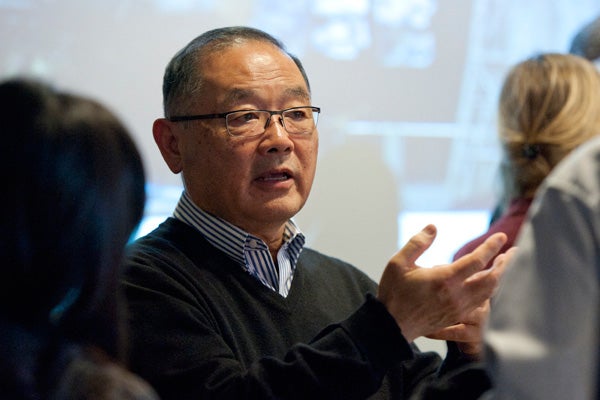|
March 22, 2011
Japan will rebound, nuclear energy won't diminish, Stanford specialists say
Scholars focusing on Japan and nuclear energy expect the country to rebound soon while the world forges ahead with a review – and ultimate continuation – of nuclear power facilities. By Adam Gorlick

Dan Okimoto, a professor emeritus of political science and an expert on Japanese politics and economics, expects the country's economy to turn upward by the end of the year. (Photo: Linda A. Cicero / Stanford News Service) The images and stories streaming from Japan as the country responds to the natural and nuclear disasters are alarming: devastated landscapes, billowing smoke and thousands of deaths. But a panel of Stanford experts say the catastrophe does not spell the end for Japan's economy or nuclear energy.
"Out of this tragedy, my sense is that Japan will develop a new sense of national mission," said Dan Okimoto, a professor emeritus of political science and an expert on Japanese politics and economics.
He predicts the country will be able to absorb the estimated $235 billion in cleanup and recovery costs, and expects the economy will pick up by the end of the year.
Noting that the Japanese have endured a "loss of confidence, a loss of purpose and mission" since the country's economic bubble burst a quarter century ago, Okimoto said the March 11 earthquake that triggered a tsunami which in turn crippled the nuclear power plant in Fukushima "may be a wakeup call" for a government entangled in political gridlock.
"After the crisis, it's possible – although maybe not probable – that a new political realignment will happen," Okimoto said. " I hope there will be a reorientation and a development of a new strategy for Japan that will achieve recovery and steady growth.
Okimoto spoke Monday at a symposium sponsored by Stanford's Center for International Security and Cooperation, where he was joined by Alan Hanson, a visiting scholar at CISAC, and Kate Marvel, a Perry Fellow at CISAC focusing on energy security and nuclear nonproliferation.
Hanson, who was in Japan when the earthquake struck but hundreds of miles from the epicenter, called the situation "one of the greatest disasters in modern times."
And while he outlined the situation that's damaged the nuclear power plant and will take "several more weeks" to get under control, he cautioned against overreacting to public health threats.
"This should not cause major health effects to the local population," said Hanson, who is the executive vice president of technologies and used fuel management for the nuclear energy company AREVA.
He criticized media coverage that has conjured images of "a big cloud of radiation coming to us."
"This is not going to happen under any conceivable circumstance," he said.
And the disaster also isn't likely to slow down an international appetite for nuclear energy, Marvel said. Although nuclear power is expensive, fraught with licensing problems and – as accidents at Three Mile Island, Chernobyl and Fukushima have proven – dangerous, economic powerhouses like China and India are relying more and more on it.
Marvel, who has a PhD in theoretical physics, anticipates that countries that use nuclear power will implement reactor safety reviews and step up their debates and discussions over how to best deal with the spent fuel produced in the plants.
And although it's impossible to "design away the potential for every accident," Marvel said there is no foreseeable end to nuclear power.
"Too many countries depend too heavily on it," she said. "And the future of its use will be determined by the countries that most aggressively pursue it."
-30-
|